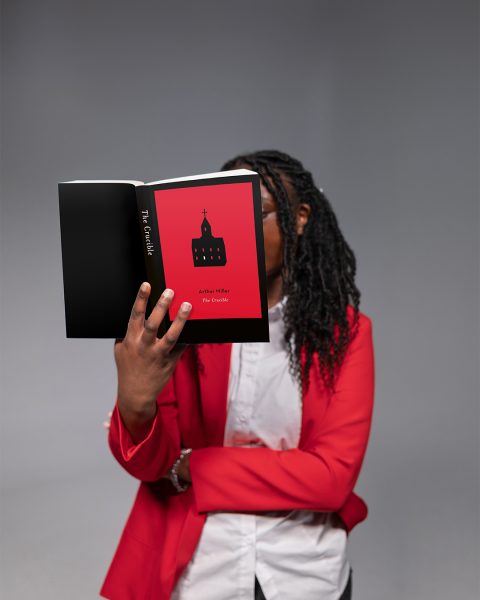ISU Theatre presents two gripping plays in repertory this April
Author: Stacey Maifeld
Author: Stacey Maifeld

Did you study “The Crucible” in high school English class? This April, you can see the American classic in a new light as ISU Theatre presents it in repertory with the critically acclaimed contemporary play “John Proctor is the Villain.”
With entirely separate casts and creative teams, the shows will share a two-weekend run April 18 – 28. Fisher Theater’s stage crews will hustle to turn the sets over six different times, giving you an option to see each show on the same weekend. While the theatre term repertory sometimes refers to a shared cast, in this case, it means the opportunity to experience two productions in combination and conversation with one another.
Based on the Salem witch trials of 1692, Arthur Miller’s “The Crucible” tells the story of a village embroiled in a witch hunt. As accusations of witchcraft escalate and neighbors testify against one another, the community lives in a constant state of fear.
Cason Murphy, assistant professor of theatre and director for the production, remembers first encountering the play as a student in an AP English class. While his teacher led the class through a rich analysis, Murphy said he was always a bit ambivalent about the play as an adult.
“I hadn’t encountered it in my theatrical life since then and certainly never planned to direct it,” he said. “However, when our season advisory committee suggested that ISU Theatre produce the very popular ‘John Proctor is the Villain,’ I had new life breathed into my interest around ‘The Crucible.'”
“The Crucible,” the 1953 Tony Award winner, arose from Miller’s desire to write about the Red Scare, a period of anti-Communist hysteria in the 20th century United States. Miller used the setting of the “The Crucible” as a mirror for his own time, and Murphy said the play is still speaking today.
“We throw the term ‘witch hunt’ around so much, like many other pieces of language, it can lose meaning if used as such a blanket for an idea,” Murphy said. “Digging into the language that Arthur Miller uses, and the dramatic situation he puts his characters into, has reminded my cast and me just what this text still has to say to us 70 years later.”
Michael McAuliff (’25 history), who plays the role of John Proctor, a farmer, husband, and father, said the play shows there’s more to every story.
“I hope people think about what the play means and how it’s still applicable and relevant to today’s world,” he said. “Even in the present, people are far too quick to blame others and vilify members of an ‘out’ group before actually hearing the full story, and I think that, despite the Red Scare being over, that kind of feeling is still very prevalent.”

Alongside “The Crucible,” ISU Theatre will present “John Proctor is the Villain,” a contemporary play by Kimberly Belflower. As a high school class explores “The Crucible” in present-day Appalachia, scandal begins to swirl in their community and the assignment leads to an examination of power, love, and sex education.
Belflower wrote her new play inspired by the #MeToo movement, giving Miller’s timeless themes an emotional and thought-provoking new spin.
Tiffany Johnson, co-founder of the Des Moines-based Pyramid Theatre Company and the show’s director, said the play allows students to examine power dynamics and discuss important topics like consent, agency, and accountability. With its expressive, Gen Z-specific dialogue, the show also resonates personally for today’s students.
“In essence, ‘John Proctor is the Villain’ offers these students a mirror to their own lives, creating a powerful and transformative educational experience that goes beyond the classroom walls,” Johnson said. “The play’s ability to connect with the students on such a personal level underscores the enduring relevance of theatre as a medium for social commentary and change.”
Cyntechy Boduo (’27 performing arts) plays high school student Nell, and while the role of a 21st-century teenager may seem more accessible for an Iowa State student than that of a Puritan farmer, Boduo said the cast spent a lot of time researching the world of their characters.
“One thing that has surprised me about preparing for this show is the necessary digging and deep thinking we do as a cast to fully understand the play,” she said. “We spend time looking back at how we acted when we were the age of the characters, and also discuss articles and ideas that relate to the play. It’s important that we are aware of those things so that the play is accurately represented.”
Zane McSheehy (’25 performing arts), who plays teacher Mr. Smith, said the plot of the show is “100% plausible” and demonstrates the power of young people using their voice.
“I think Gen Z is one of the best-suited generations to do a show like this because we are so aware of the power that our words have when we actually use them,” he said.
“The Crucible” show times are April 18, April 19, and April 27 at 7:30 p.m., with a matinee on April 28 at 3:00 p.m. “John Proctor is the Villain” will run April 20, April 25, and April 26 at 7:30 p.m. A matinee performance will be held April 21 at 3:00 p.m. This play contains adult language and content.
Each show’s ticket is general admission ($20 for adults; youth and Iowa State students are free). Tickets can be purchased at the door or the Iowa State Center Ticket Office, Monday – Friday, 11:00 a.m. – 4:00 p.m. For ticket information, visit theatre.iastate.edu.